都德的《最后一课》(The Last Class) 英文译本
- 格式:docx
- 大小:16.72 KB
- 文档页数:5
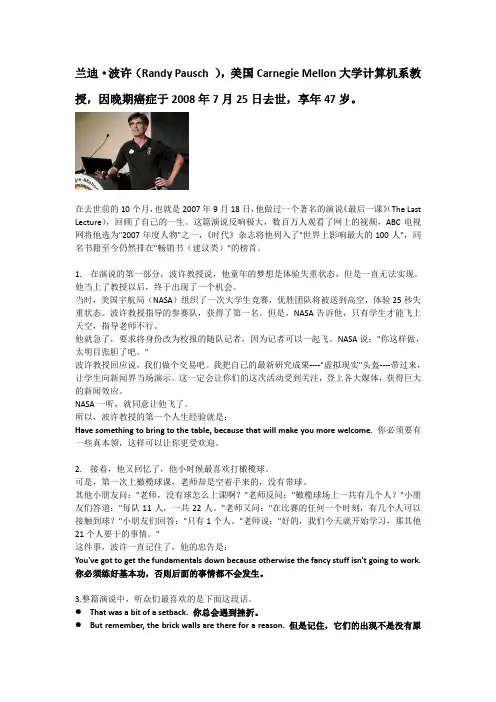
兰迪·波许(Randy Pausch ),美国Carnegie Mellon大学计算机系教授,因晚期癌症于2008年7月25日去世,享年47岁。
在去世前的10个月,也就是2007年9月18日,他做过一个著名的演说《最后一课》(The Last Lecture),回顾了自己的一生。
这篇演说反响极大,数百万人观看了网上的视频,ABC电视网将他选为"2007年度人物"之一,《时代》杂志将他列入了"世界上影响最大的100人",同名书籍至今仍然排在"畅销书(建议类)"的榜首。
1.在演说的第一部分,波许教授说,他童年的梦想是体验失重状态,但是一直无法实现。
他当上了教授以后,终于出现了一个机会。
当时,美国宇航局(NASA)组织了一次大学生竞赛,优胜团队将被送到高空,体验25秒失重状态。
波许教授指导的参赛队,获得了第一名。
但是,NASA告诉他,只有学生才能飞上天空,指导老师不行。
他就急了,要求将身份改为校报的随队记者,因为记者可以一起飞。
NASA说:"你这样做,太明目张胆了吧。
"波许教授回应说,我们做个交易吧。
我把自己的最新研究成果----"虚拟现实"头盔----带过来,让学生向新闻界当场演示。
这一定会让你们的这次活动受到关注,登上各大媒体,获得巨大的新闻效应。
NASA一听,就同意让他飞了。
所以,波许教授的第一个人生经验就是:Have something to bring to the table, because that will make you more welcome. 你必须要有一些真本领,这样可以让你更受欢迎。
2.接着,他又回忆了,他小时候最喜欢打橄榄球。
可是,第一次上橄榄球课,老师却是空着手来的,没有带球。
其他小朋友问:"老师,没有球怎么上课啊?"老师反问:"橄榄球场上一共有几个人?"小朋友们答道:"每队11人,一共22人。
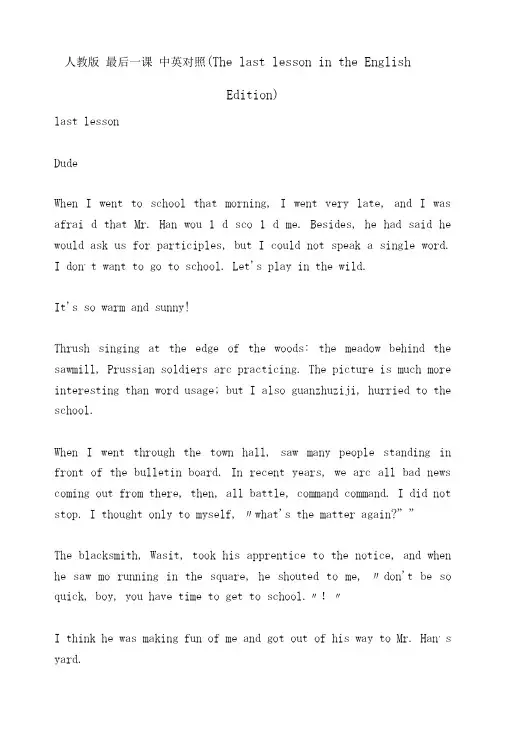
人教版最后一课中英对照(The last lesson in the EnglishEdition)last lessonDudeWhen I went to school that morning, I went very late, and I was afrai d that Mr. Han wou 1 d sco 1 d me. Besides, he had said he would ask us for participles, but I could not speak a single word.I don,t want to go to school. Let's play in the wild.It's so warm and sunny!Thrush singing at the edge of the woods: the meadow behind the sawmill, Prussian soldiers arc practicing. The picture is much more interesting than word usage; but I also guanzhuziji, hurried to the school.When I went through the town hall, saw many people standing in front of the bulletin board. In recent years, we arc all bad news coming out from there, then, all battle, command command. I did not stop. I thought only to myself, 〃what's the matter again?””The blacksmith, Wasit, took his apprentice to the notice, and when he saw mo running in the square, he shouted to me, 〃don't be so quick, boy, you have time to get to school.〃!〃I think he was making fun of me and got out of his way to Mr. Han,s yard.On weekdays, when school begins, there is always a commotion, justto hear it on the street. Start the school table, turn off the desk, we are afraid of noisy, covered with ears, loudly endorsementThere is a teacher with a big iron rulerknocking on the table a "quiet, quiet ......... 〃I was going to take a commotion and sneak into my seat: but on that day, everything had quiet, like a Sunday morning. Through the open window I saw the students in their seats; and Monsieur Hame 1,under his arm, with the terrible iron ruler. I had to push the door open and walk into the quiet classroom in front of everyone. Youcan imagine how red I was and how worried my heart was!But nothing at all. Monsieur Hame 1 looked at me and said very gently: 〃go and sit down, small Fulangshi, we were going to begin without you. 〃As soon as I jumped over the bench, I sat down. My heart calmed down a little, I noticed that our teacher had on his beautifulgreen coat, which ruffled the tie, wearing the black silk embroidered hat. This set of clothes, he only in the inspection and prize day wear. And the whole classroom has an unusual, serious atmosphere. What surprised me most, behind a few empty row alwayssat on the bench of many people in the town, they also like us. The old man Hao old man, wearing his hat, the ex mayor, the ex postman, and others besides. Everyone looked sad. Hao big primer with a Book broken, he open the book, the book stand on his knee, with hisgreat spectacles askew.I saw these circumstances are surprised, Monsieur Hamel had sat on the chair, I just like to talk, and soft and solemnly said tous: 〃my children, this is the last time I teach you. The order has come from Berlin, the schools of Alsace and Lorraine to teach only german. The new teacher will arrive tomorrow. Today is your last lesson in French. I hope you will study hard.〃I heard these words, my heart very sad, ah, those bad guys, they put up at the town hall, the original is such a thing!My last lesson in French!I can hardly write a composition! I can,t learn French any more! Is that all right? I haven,t Study hard, open class to find the nest, or sliding on the saar ............. How regretful I am to thinkof it! I have these textbooks, grammar, history, just now I feel so bored, so heavy, and now it seems like an old friend of mine, reluctant to part with them. And Mr. Han, too. He was about to leave, and I could never see him again! Think of these, I forget him for my punishment, forget my next ruler.Poor man!He put on his beautiful gown in memory of the last lesson! Now I see why the old people in the town are sitting in the classroom. It seemed to me that they regretted not having come to school so often. In this way they thanked our teacher for 40 years of his loyal service to show his respect for the lost territory.As I was thinking of it, I heard the teacher calling me by name.It was my turn to recite. God, if I can say that famous, difficult participle from beginning to end, loud, clear and without a single mistake, I' 11 take it at any cost. I might have been confused bythe first few words,I had to stand there and shake, and I felt so miserable that I could not lift my head. I heard Mr. Hamel speak to me:〃I don,t blame you, you must be Fulangshi small, hard enough. Here you are. People think so every day: "forget it, there,s plenty of time, and it's not too late to study tomorrow. 〃 Now, look at our results. Alas, we must put our study aside till tomorrow, which is the greatest misfortune for the people of Alsace. Now those guys have a reason to say, 'what? You say you' re French, you don,t even speak your own language, you can,t write it? However, the poor little Fulangshi, you are not a fault, we all have many places to blame himself. 〃〃Your parents for your study do not care enough. They have to earn a little money, would rather that you left the book into the ground, to go to work at the mills. What about me? Don,t I have to blame myself? Didn,t I often ask you to leave your homework and water the flowers for me? Didn,t I just give you a day off when I went fishing? .............................. 〃Then, Mr. Han spoke of it from that event, talking about French phonetics. He said that the French language is the most beautiful language in the world, the most accurate; that said, we must keep it in mind, never forget it, the death of the country when the slaves of the people, as long as remember their language, it is as if it held the key to its prison. And here, he opened a book about grammar. It's strange. I know all about listening today, lie seems very easy to talk about. It's easy. I felt I had never listened so carefully, and he had never been so patient with me. The poor manseemed to wish to teach us everything he knew before he left, and thrust it into our heads.The grammar class finished, we had a writing class. That day, Monsieur Hame1 gave us new examples, on which was a beautiful round hand: "France”, "Alsace”, "France”, 〃Alsace〃・They were hanging from the rods of our desks, like little flags fluttering in the classroom. The individual was so attentive and so quiet in the classroom! I could only hear the pen whispering on the paper. Sometimes some bug fly in, but who do not pay attention to, even the youngest child is not distracted, they are concentrating on painting 〃beam〃,as it is the French word. On the roof of dove cooed softly cried, I thought: "they should not force these dove with Germany to sing!”Every time I looked up, I saw Mr. Hamel sitting in his chair, motionless, staring at the things around him as if to take everything in the small classroom into his eyes. Just think: for 40 years, he has been here, with his yard in front of his students; with many years of desks and chairs, polishing, wear: the walnut trees had grown; he personally planted wisteria, now also climbed around the windows to the roof. Poor man, now that he breaks up with all this, how can he not be sad? What's more, he heard his sister walking up and down the stairs to pack up! They're leaving this place for good tomorrow.But he has enough courage to stick out his lessons for the day.The writing is finished, he taught a lesson in history, then teach junior class spell their Ba, be, Bi, Bo, bu. In the back seat, Hao big old man was wearing glasses, holding the hands of his readers, spelled out the letters with them. He was so excited that his voicetrembled. Hearing his strange voice, we laughed and felt sad again. Ah! I'11 never forget the last lesson!Suddenly, the church clock struck 12. The bells of prayer rang too. The window came the sound of the Prussian soldiers —they have bring drill to an end. Mr. Han stood up. His face was pale. I thought he was never so tall.〃My friends, " he said, 〃I ― I ―But he gulped down, he said.He turned to the blackboard, picked up a piece of chalk, and, with all his strength, wrote two large characters:Long live France!,zThen he stayed there, his head against the wall, without saying anything, and just made a gesture to us: "scatter, - you go!〃.〃The, Last, Class - The, Story, of, , a, Little, AlsatianI, WAS, very, late, for, that, morning, and, I, was, afraid, of, being, scolded, especially, as, Monsieur, Hame 1, had, told, terribly, US, that,, he, should, school, examine, participles, US, on,我不知道他们的第一件事。
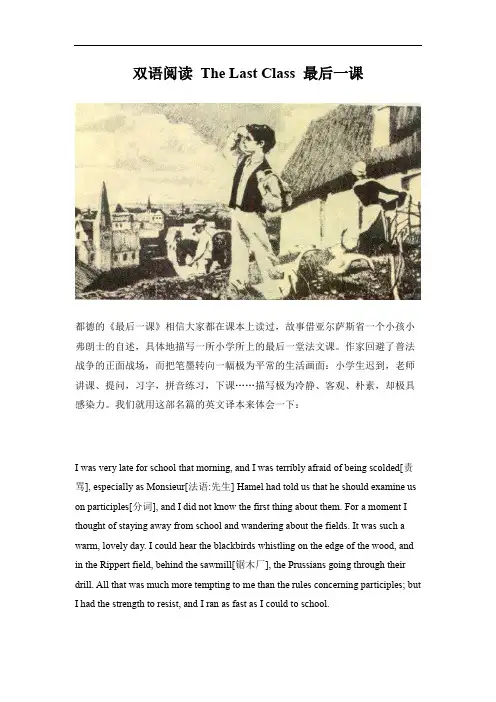
双语阅读The Last Class 最后一课都德的《最后一课》相信大家都在课本上读过,故事借亚尔萨斯省一个小孩小弗朗士的自述,具体地描写一所小学所上的最后一堂法文课。
作家回避了普法战争的正面战场,而把笔墨转向一幅极为平常的生活画面:小学生迟到,老师讲课、提问,习字,拼音练习,下课……描写极为冷静、客观、朴素,却极具感染力。
我们就用这部名篇的英文译本来体会一下:I was very late for school that morning, and I was terribly afraid of being scolded[责骂], especially as Monsieur[法语:先生] Hamel had told us that he should examine us on participles[分词], and I did not know the first thing about them. For a moment I thought of staying away from school and wandering about the fields. It was such a warm, lovely day. I could hear the blackbirds whistling on the edge of the wood, and in the Rippert field, behind the sawmill[锯木厂], the Prussians going through their drill. All that was much more tempting to me than the rules concerning participles; but I had the strength to resist, and I ran as fast as I could to school.那天早晨,我去上学,去得非常晚,我好害怕被责骂,特别是,阿麦尔先生跟我们说过,他要考一考分词规则,而我连头一个字都不会。
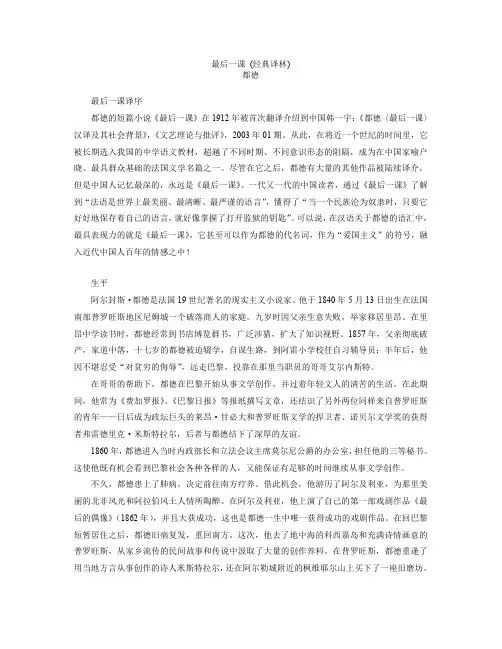
最后一课(经典译林)都德最后一课译序都德的短篇小说《最后一课》在1912年被首次翻译介绍到中国韩一宇:《都德〈最后一课〉汉译及其社会背景》,《文艺理论与批评》,2003年01期。
从此,在将近一个世纪的时间里,它被长期选入我国的中学语文教材,超越了不同时期、不同意识形态的阻隔,成为在中国家喻户晓、最具群众基础的法国文学名篇之一。
尽管在它之后,都德有大量的其他作品被陆续译介,但是中国人记忆最深的,永远是《最后一课》。
一代又一代的中国读者,通过《最后一课》了解到“法语是世界上最美丽、最清晰、最严谨的语言”,懂得了“当一个民族沦为奴隶时,只要它好好地保存着自己的语言,就好像掌握了打开监狱的钥匙”。
可以说,在汉语关于都德的语汇中,最具表现力的就是《最后一课》,它甚至可以作为都德的代名词,作为“爱国主义”的符号,融入近代中国人百年的情感之中!生平阿尔封斯·都德是法国19世纪著名的现实主义小说家。
他于1840年5月13日出生在法国南部普罗旺斯地区尼姆城一个破落商人的家庭。
九岁时因父亲生意失败,举家移居里昂。
在里昂中学读书时,都德经常到书店博览群书,广泛涉猎,扩大了知识视野。
1857年,父亲彻底破产,家道中落,十七岁的都德被迫辍学,自谋生路,到阿雷小学校任自习辅导员;半年后,他因不堪忍受“对贫穷的侮辱”,远走巴黎,投靠在那里当职员的哥哥艾尔内斯特。
在哥哥的帮助下,都德在巴黎开始从事文学创作,并过着年轻文人的清苦的生活。
在此期间,他常为《费加罗报》、《巴黎日报》等报纸撰写文章,还结识了另外两位同样来自普罗旺斯的青年——日后成为政坛巨头的莱昂·甘必大和普罗旺斯文学的捍卫者、诺贝尔文学奖的获得者弗雷德里克·米斯特拉尔,后者与都德结下了深厚的友谊。
1860年,都德进入当时内政部长和立法会议主席莫尔尼公爵的办公室,担任他的三等秘书。
这使他既有机会看到巴黎社会各种各样的人,又能保证有足够的时间继续从事文学创作。

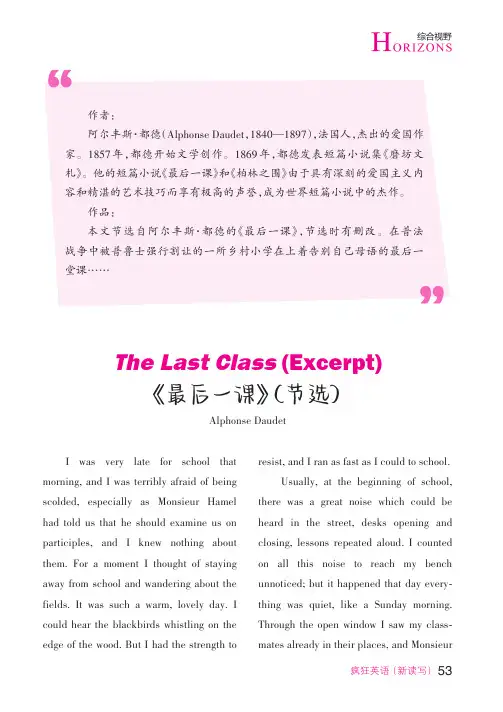
疯狂英语 (新读写)作者:阿尔丰斯·都德(Alphonse Daudet ,1840—1897),法国人,杰出的爱国作家。
1857年,都德开始文学创作。
1869年,都德发表短篇小说集《磨坊文札》。
他的短篇小说《最后一课》和《柏林之围》由于具有深刻的爱国主义内容和精湛的艺术技巧而享有极高的声誉,成为世界短篇小说中的杰作。
作品:本文节选自阿尔丰斯·都德的《最后一课》,节选时有删改。
在普法战争中被普鲁士强行割让的一所乡村小学在上着告别自己母语的最后一堂课……The Last Class (Excerpt)《最后一课》(节选)Alphonse DaudetI was very late for school thatmorning, and I was terribly afraid of being scolded, especially as Monsieur Hamel had told us that he should examine us on participles, and I knew nothing aboutthem. For a moment I thought of staying away from school and wandering about thefields. It was such a warm, lovely day. I could hear the blackbirds whistling on the edge of the wood. But I had the strength toresist, and I ran as fast as I could to school.Usually, at the beginning of school,there was a great noise which could beheard in the street, desks opening and closing, lessons repeated aloud. I countedon all this noise to reach my bench unnoticed; but it happened that day everything was quiet, like a Sunday morning. Through the open window I saw my classmates already in their places, and Monsieur“”53Crazy English2024.5Hamel walking back and forth. I had to open the door and enter, in the midst of that perfect silence. You can imagine whether I blushed and whether I was afraid!But Monsieur Hamel looked at mewith no sign of anger and said very gently,“Go at once to your seat, my little Frantz; we were going to begin without you.”I stepped over the bench and satdown at once at my desk. Not until then, when I had partly recovered from my fright, did I notice that our teacher had on his handsome blue coat, which he wore only on days of inspection or ofdistribution of prizes. But what surprisedme most was to see at the back of the room, on the benches which were usually empty, some people from the village sitting, as silent as we were. They all seemed depressed.While I was wondering at all this,Monsieur Hamel had mounted his platform, and in the same gentle and serious voice with which he had welcomedme, he said to us, “My children, this is the last time that I shall teach you. Orders have come from Berlin to teach nothingbut German in the schools of Alsaceand Lorraine. The new teacher arrivestomorrow. This is the last class in French, so I beg you to be very attentive.”Those few words overwhelmed me.My last class in French! How angry I was with myself because of the time I hadwasted and the lessons I had missed. My books, which only a moment before I thought so tiresome and so heavy to carry —my grammar and my history —seemed to me now like old friends. And it was the same about Monsieur Hamel. The thought that he was going away and that I should never see him again, made me forget thepunishments.Poor man! It was in honour of that lastlesson that he had put on his fine clothes; and I understood now why those old fellows from the village were sitting at theend of the room. It seemed to mean that they regretted not having come oftener to the school. It was also a way of thanking our teacher for his forty years of faithful service, and of paying their respect to thefatherland which was vanishing.Reading CheckWhy were there people from the village sitting in the back of the classroom?54。
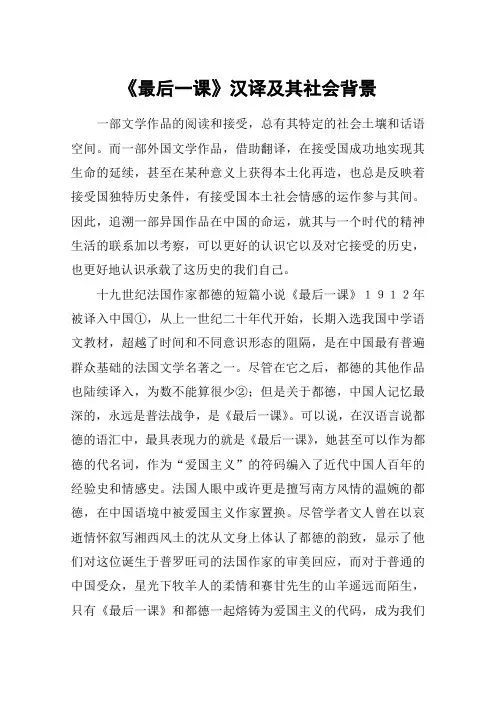
《最后一课》汉译及其社会背景一部文学作品的阅读和接受,总有其特定的社会土壤和话语空间。
而一部外国文学作品,借助翻译,在接受国成功地实现其生命的延续,甚至在某种意义上获得本土化再造,也总是反映着接受国独特历史条件,有接受国本土社会情感的运作参与其间。
因此,追溯一部异国作品在中国的命运,就其与一个时代的精神生活的联系加以考察,可以更好的认识它以及对它接受的历史,也更好地认识承载了这历史的我们自己。
十九世纪法国作家都德的短篇小说《最后一课》1912年被译入中国①,从上一世纪二十年代开始,长期入选我国中学语文教材,超越了时间和不同意识形态的阻隔,是在中国最有普遍群众基础的法国文学名著之一。
尽管在它之后,都德的其他作品也陆续译入,为数不能算很少②;但是关于都德,中国人记忆最深的,永远是普法战争,是《最后一课》。
可以说,在汉语言说都德的语汇中,最具表现力的就是《最后一课》,她甚至可以作为都德的代名词,作为“爱国主义”的符码编入了近代中国人百年的经验史和情感史。
法国人眼中或许更是擅写南方风情的温婉的都德,在中国语境中被爱国主义作家置换。
尽管学者文人曾在以哀逝情怀叙写湘西风土的沈从文身上体认了都德的韵致,显示了他们对这位诞生于普罗旺司的法国作家的审美回应,而对于普通的中国受众,星光下牧羊人的柔情和赛甘先生的山羊遥远而陌生,只有《最后一课》和都德一起熔铸为爱国主义的代码,成为我们自己精神财富的一部分。
由此可见,对一个作家的接受,尤其是对一个异域作家的跨文化接受,有时会出现对这一作家的部分的强调或部分的偏废,它是接受者自主选择的结果,与接受者所处的历史文化现场有着千丝万缕的关联。
法国文学史家朗松曾言,“每部代表作的历史都浓缩着生产该作品的民族以及接受这一作品的其他民族的兴趣史和敏感史”③。
因此,还原一个作品的跨文化阅读中所牵涉的历史语境,考察其最初接受者的阅读敏感,有助于理解这一作品在相异文化中的机遇,同时也能揭示接受者自我在外来作品的本土化运作中的意义。
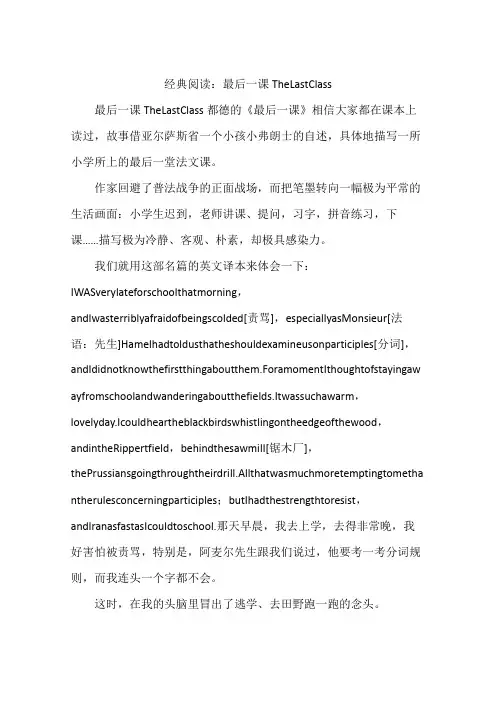
经典阅读:最后一课TheLastClass最后一课TheLastClass都德的《最后一课》相信大家都在课本上读过,故事借亚尔萨斯省一个小孩小弗朗士的自述,具体地描写一所小学所上的最后一堂法文课。
作家回避了普法战争的正面战场,而把笔墨转向一幅极为平常的生活画面:小学生迟到,老师讲课、提问,习字,拼音练习,下课……描写极为冷静、客观、朴素,却极具感染力。
我们就用这部名篇的英文译本来体会一下:IWASverylateforschoolthatmorning,andIwasterriblyafraidofbeingscolded[责骂],especiallyasMonsieur[法语:先生]Hamelhadtoldusthatheshouldexamineusonparticiples[分词],andIdidnotknowthefirstthingaboutthem.ForamomentIthoughtofstayingaw ayfromschoolandwanderingaboutthefields.Itwassuchawarm,lovelyday.Icouldheartheblackbirdswhistlingontheedgeofthewood,andintheRippertfield,behindthesawmill[锯木厂],thePrussiansgoingthroughtheirdrill.Allthatwasmuchmoretemptingtometha ntherulesconcerningparticiples;butIhadthestrengthtoresist,andIranasfastasIcouldtoschool.那天早晨,我去上学,去得非常晚,我好害怕被责骂,特别是,阿麦尔先生跟我们说过,他要考一考分词规则,而我连头一个字都不会。
这时,在我的头脑里冒出了逃学、去田野跑一跑的念头。
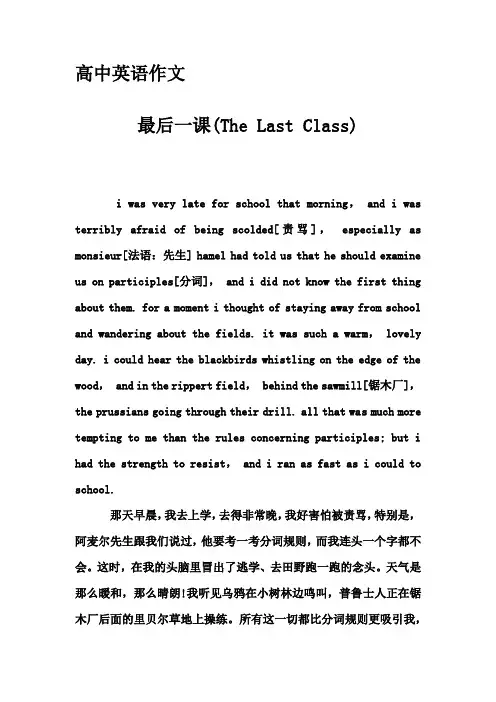
高中英语作文最后一课(The Last Class)i was very late for school that morning, and i was terribly afraid of being scolded[责骂],especially as monsieur[法语:先生] hamel had told us that he should examine us on participles[分词], and i did not know the first thing about them. for a moment i thought of staying away from school and wandering about the fields. it was such a warm, lovely day. i could hear the blackbirds whistling on the edge of the wood, and in the rippert field, behind the sawmill[锯木厂],the prussians going through their drill. all that was much more tempting to me than the rules concerning participles; but i had the strength to resist, and i ran as fast as i could to school.那天早晨,我去上学,去得非常晚,我好害怕被责骂,特别是,阿麦尔先生跟我们说过,他要考一考分词规则,而我连头一个字都不会。
这时,在我的头脑里冒出了逃学、去田野跑一跑的念头。
天气是那么暖和,那么晴朗!我听见乌鸦在小树林边鸣叫,普鲁士人正在锯木厂后面的里贝尔草地上操练。
所有这一切都比分词规则更吸引我,但我还是顶住了诱惑,加快脚步向学校方向跑去。
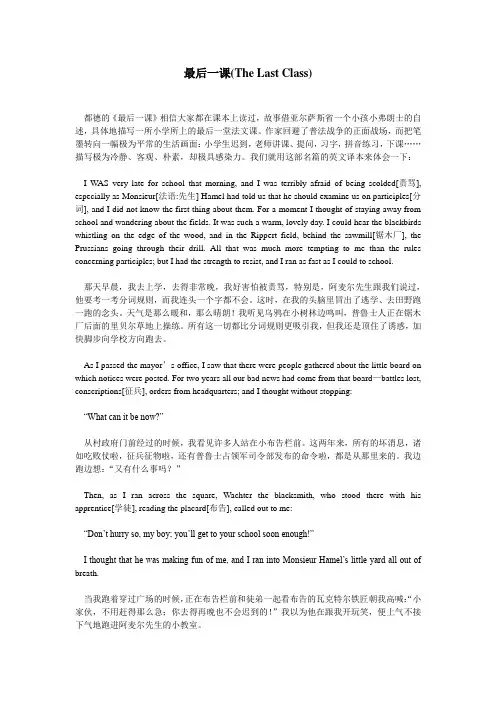
最后一课(The Last Class)都德的《最后一课》相信大家都在课本上读过,故事借亚尔萨斯省一个小孩小弗朗士的自述,具体地描写一所小学所上的最后一堂法文课。
作家回避了普法战争的正面战场,而把笔墨转向一幅极为平常的生活画面:小学生迟到,老师讲课、提问,习字,拼音练习,下课……描写极为冷静、客观、朴素,却极具感染力。
我们就用这部名篇的英文译本来体会一下:I WAS very late for school that morning, and I was terribly afraid of being scolded[责骂], especially as Monsieur[法语:先生] Hamel had told us that he should examine us on participles[分词], and I did not know the first thing about them. For a moment I thought of staying away from school and wandering about the fields. It was such a warm, lovely day. I could hear the blackbirds whistling on the edge of the wood, and in the Rippert field, behind the sawmill[锯木厂], the Prussians going through their drill. All that was much more tempting to me than the rules concerning participles; but I had the strength to resist, and I ran as fast as I could to school.那天早晨,我去上学,去得非常晚,我好害怕被责骂,特别是,阿麦尔先生跟我们说过,他要考一考分词规则,而我连头一个字都不会。
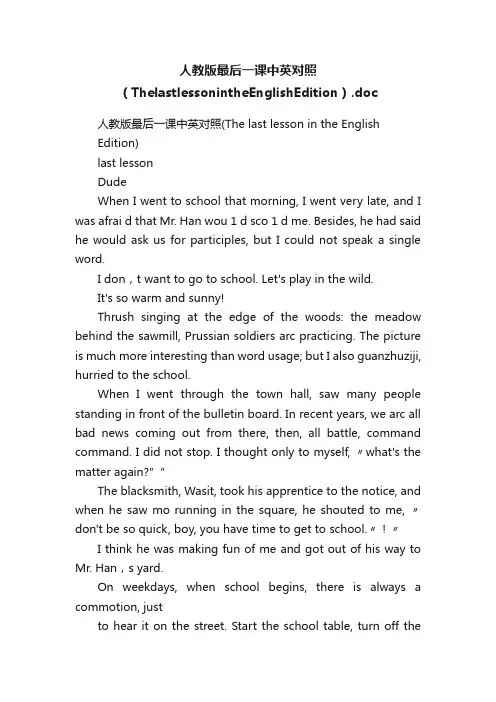
人教版最后一课中英对照(ThelastlessonintheEnglishEdition).doc人教版最后一课中英对照(The last lesson in the EnglishEdition)last lessonDudeWhen I went to school that morning, I went very late, and I was afrai d that Mr. Han wou 1 d sco 1 d me. Besides, he had said he would ask us for participles, but I could not speak a single word.I don,t want to go to school. Let's play in the wild.It's so warm and sunny!Thrush singing at the edge of the woods: the meadow behind the sawmill, Prussian soldiers arc practicing. The picture is much more interesting than word usage; but I also guanzhuziji, hurried to the school.When I went through the town hall, saw many people standing in front of the bulletin board. In recent years, we arc all bad news coming out from there, then, all battle, command command. I did not stop. I thought only to myself, 〃what's the matter again?””The blacksmith, Wasit, took his apprentice to the notice, and when he saw mo running in the square, he shouted to me, 〃don't be so quick, boy, you have time to get to school.〃!〃I think he was making fun of me and got out of his way to Mr. Han,s yard.On weekdays, when school begins, there is always a commotion, justto hear it on the street. Start the school table, turn off thedesk, we are afraid of noisy, covered with ears, loudly endorsementThere is a teacher with a big iron rulerknocking on the table a "quiet, quiet ......... 〃I was going to take a commotion and sneak into my seat: but on that day, everything had quiet, like a Sunday morning. Through the open window I saw the students in their seats; and Monsieur Hame 1,under his arm, with the terrible iron ruler. I had to push the door open and walk into the quiet classroom in front of everyone. Youcan imagine how red I was and how worried my heart was!But nothing at all. Monsieur Hame 1 looked at me and said very gently: 〃go and sit down, small Fulangshi, we were going to begin without you. 〃As soon as I jumped over the bench, I sat down. My heart calmed down a little, I noticed that our teacher had on his beautifulgreen coat, which ruffled the tie, wearing the black silk embroidered hat. This set of clothes, he only in the inspection and prize day wear. And the whole classroom has an unusual, serious atmosphere. What surprised me most, behind a few empty row alwayssat on the bench of many people in the town, they also like us. The old man Hao old man, wearing his hat, the ex mayor, the ex postman, and others besides. Everyone looked sad. Hao big primer with a Book broken, he open the book, the book stand on his knee, with hisgreat spectacles askew.I saw these circumstances are surprised, Monsieur Hamel hadsat on the chair, I just like to talk, and soft and solemnly said to us: 〃my children, this is the last time I teach you. The order has come from Berlin, the schools of Alsace and Lorraine to teach only german. The new teacher will arrive tomorrow. Today is your last lesson in French. I hope you will study hard.〃I heard these words, my heart very sad, ah, those bad guys, they put up at the town hall, the original is such a thing!My last lesson in French!I can hardly write a composition! I can,t learn French any more! Is that all right? I haven,t Study hard, open class to find the nest, or sliding on the saar ............. How regretful I am to think of it! I have these textbooks, grammar, history, just now I feel so bored, so heavy, and now it seems like an old friend of mine, reluctant to part with them. And Mr. Han, too. He was about to leave, and I could never see him again! Think of these, I forget him for my punishment, forget my next ruler.Poor man!He put on his beautiful gown in memory of the last lesson! Now I see why the old people in the town are sitting in the classroom. It seemed to me that they regretted not having come to school so often. In this way they thanked our teacher for 40 years of his loyal service to show his respect for the lost territory.As I was thinking of it, I heard the teacher calling me by name.It was my turn to recite. God, if I can say that famous, difficult participle from beginning to end, loud, clear and without a single mistake, I' 11 take it at any cost. I might have been confused by the first few words,I had to stand there and shake, and I felt so miserable that I could not lift my head. I heard Mr. Hamel speak to me: 〃I don,t blame you, you must be Fulangshi small, hardenough. Here you are. People think so every day: "forget it, there,s plenty of time, and it's not too late to study tomorrow. 〃 Now, look at our results. Alas, we must put our study aside till tomorrow, which is the greatest misfortune for the people of Alsace. Now those guys have a reason to say, 'what? You say you' re French, you don,t even speak your own language, you can,t write it? However, the poor little Fulangshi, you are not a fault, we all have many places to blame himself. 〃〃Your parents for your study do not care enough. They have to earn a little money, would rather that you left the book into the ground, to go to work at the mills. What about me? Don,t I have to blame myself? Didn,t I often ask you to leave your homework and water the flowers for me? Didn,t I just give you a day off when I went fishing? .............................. 〃Then, Mr. Han spoke of it from that event, talking about French phonetics. He said that the French language is the most beautiful language in the world, the most accurate; that said, we must keep it in mind, never forget it, the death of the country when the slaves of the people, as long as remember their language, it is as if it held the key to its prison. And here, he opened a book about grammar. It's strange. I know all about listening today, lie seems very easy to talk about. It's easy. I felt I had never listened so carefully, and he had never been so patient with me. The poor manseemed to wish to teach us everything he knew before he left, and thrust it into our heads.The grammar class finished, we had a writing class. That day, Monsieur Hame1 gave us new examples, on which was a beautiful round hand: "France”, "Alsace”, "France”, 〃Alsace〃?They were hanging from the rods of our desks, like littleflags fluttering in the classroom. The individual was so attentive and so quiet in the classroom! I could only hear the pen whispering on the paper. Sometimes some bug fly in, but who do not pay attention to, even the youngest child is not distracted, they are concentrating on painting 〃beam〃,as it is the French word. On the roof of dove cooed softly cried, I thought: "they should no t force these dove with Germany to sing!”Every time I looked up, I saw Mr. Hamel sitting in his chair, motionless, staring at the things around him as if to take everything in the small classroom into his eyes. Just think: for 40 years, he has been here, with his yard in front of his students; with many years of desks and chairs, polishing, wear: the walnut trees had grown; he personally planted wisteria, now also climbed around the windows to the roof. Poor man, now that he breaks up with all this, how can he not be sad? What's more, he heard his sister walking up and down the stairs to pack up! They're leaving this place for good tomorrow.But he has enough courage to stick out his lessons for the day.The writing is finished, he taught a lesson in history, then teach junior class spell their Ba, be, Bi, Bo, bu. In the back seat, Hao big old man was wearing glasses, holding the hands of his readers, spelled out the letters with them. He was so excited that his voicetrembled. Hearing his strange voice, we laughed and felt sad again. Ah! I'11 never forget the last lesson!Suddenly, the church clock struck 12. The bells of prayer rang too. The window came the sound of the Prussian soldiers —they have bring drill to an end. Mr. Han stood up. His face was pale. I thought he was never so tall.〃My friends, " he said, 〃I ― I ―But he gulped down, he said.He turned to the blackboard, picked up a piece of chalk, and, with all his strength, wrote two large characters:Long live France!,zThen he stayed there, his head against the wall, without saying anything, and just made a gesture to us: "scatter, - you go!〃.〃The, Last, Class - The, Story, of, , a, Little, AlsatianI, WAS, very, late, for, that, morning, and, I, was, afraid, of, being, scolded, especially, as, Monsieur, Hame 1, had, told, terribly, US, that,, he, should, school, examine, participles, US, on, 我不知道他们的第一件事。
郑振铎都德的最后一课读后感**Last Class of Zheng Zhenduo"s Daudet: A Reflection**Upon reading the last class of Zheng Zhenduo"s interpretation of Alphonse Daudet"s work, I was deeply moved and inspired.It serves as a poignant reminder of the importance of education and the impact a teacher can have on their students.The story highlights the significance of language and culture, emphasizing that they are not just tools for communication, but also a means to preserve identity and heritage.Zheng Zhenduo"s reflection on Daudet"s narrative underscores the emotional bond that can develop between a teacher and their students, especially during times of adversity.It is a story that resonates with the power of dedication, perseverance, and the transmission of values.The last class serves as a wake-up call to cherish every moment of learning, to appreciate the educators who shape our lives, and to defend the rights to education and cultural identity.This reflection has left me with a renewed respect for teachers and the enduring influence they can have on society.It encourages us to look beyond the confines of the classroom and to recognize the broader implications of education in shaping a more tolerant andunderstanding world.**郑振铎都德的最后一课读后感**阅读郑振铎对都德《最后一课》的解读,我深受感动且得到启发。
I was very lateway to school and was afraid of be ing scolded. The master had told us he would question us on verbs, and I did not know a thing about them, for I had not done my lesson.2 For a moment I thought ofing truant1. The air was so warm and bright, and I could hear the blackbirds whistling on the edge of the woods, and the Prussians drilling in the meadows behind the sawmill.3 I liked this much better than learn ing the rules of verbs, but I did not dare to stop, so I ran quickly towards school.6我以为他是拿我开玩笑,就跑得更快了。
到学校时,我已上气不接下气。
7 平常开始上课时,课桌的开关声和孩子们一遍遍放开嗓子念课文的声音在街上就能听到。
有时,老师还一边用重重的直尺敲打讲桌,一边喊道:“安静,请安静!”8 我本想趁着这阵喧闹神不知鬼不觉地坐到自己的座位上,但那天早上,教室里却安静而有序。
9 我从敞开的窗户看到同学们已经坐在自己的座位上,老Slow prose is the negation of the fast play. Prose takes much longer to write than drama, and requires more peace within me and within my daily life.—Jon Fosse, Norwegian playwright and novelist who won the 2023 Nobel Prize in Literature “for his innovative plays and prose which give voice to the unsayable.”。
最后一课(The Last Class)都德的《最后一课》相信大家都在课本上读过,故事借亚尔萨斯省一个小孩小弗朗士的自述,具体地描写一所小学所上的最后一堂法文课。
作家回避了普法战争的正面战场,而把笔墨转向一幅极为平常的生活画面:小学生迟到,老师讲课、提问,习字,拼音练习,下课……描写极为冷静、客观、朴素,却极具感染力。
我们就用这部名篇的英文译本来体会一下:I WAS very late for school that morning, and I was terribly afraid of being scolded[责骂], especially as Monsieur[法语:先生] Hamel had told us that he should examine us on participles[分词], and I did not know the first thing about them. For a moment I thought of staying away from school and wandering about the fields. It was such a warm, lovely day. I could hear the blackbirds whistling on the edge of the wood, and in the Rippert field, behind the sawmill[锯木厂], the Prussians going through their drill. All that was much more tempting to me than the rules concerning participles; but I had the strength to resist, and I ran as fast as I could to school.那天早晨,我去上学,去得非常晚,我好害怕被责骂,特别是,阿麦尔先生跟我们说过,他要考一考分词规则,而我连头一个字都不会。
The Art of LivingThe art of living is to know when to hold fast and when to let go. For life is a paradox: it enjoins us to cling to its many gifts even while it ordains their eventual relinquishment. The rabbis of old put it this way:" A man comes to this world with his fist clenched, but when he dies, his hand is open."Surely we ought to hold fast to life, for it is wondrous, and full of a beauty that breaks through every pore of God' s own earth. We know that this is so, but all too often we recognize this truth only in our backward glance when we remember what was and then suddenly realize that it is no more.We remember a beauty that faded, a love that waned. But we remember with far greater pain that we did not see that beauty when it flowered, that we failed to respond with love when it was tendered.A recent experience re-taught me this truth. I was hospitalized following a severe heart attack and had been in intensive care for several days. It was not a pleasant place.One morning, I had to have some additional tests. The required machines were located in a building at the opposite end of the hospital, so I had to be wheeled across the courtyard on a gurney.As we emerged from our unit, the sunlight hit me. That's all there was to my experience. Just the light of the sun. And yet how beautiful it was -- how warming, how sparking, how brilliant! I looked to see whether anyone else relished the sun's golden glow, but everyone was hurrying to and fro, most with eyes fixed on the ground. Then I remembered how often I, too, had been indifferent to the grandeur of each day, too preoccupied withpetty and sometimes even mean concerns to respond from that experience is really as commonplace as was the experience itself: life's gifts are precious -- but we are too heedless of them.Here then is the first pole of life' s paradoxical demands on us : Never too busy for the wonder and the awe of life. Be reverent before each dawning day. Embrace each hour. Seize each golden minute.Hold fast to life...but not so fast that you cannot let go. This is the second side of life' s coin, the opposite pole of its paradox: we must accept our losses, and learn how to let go.This is not an easy lesson to learn, especially when we are young and think that the world is ours to command, that whatever we desire with the full force of our passionate being can, nay, will, be ours. But then life moves along to confront us with realities, and slowly but surely this truth dawns upon us.At every stage of life we sustain losses -- and grow in the process. We begin our independent lives only when we emerge from the womb and lose its protective shelter. We enter a progression of schools, then we leave our mothers and fathers and our childhood homes. We get married and have children and then have to let them go. We confront the death of our parents and our spouses. We face the gradual or not so gradual waning of our strength. And ultimately, as the parable of the open and closed hand suggests, we must confront the inevitability of our own demise, losing ourselves as it were, all that we were or dreamed to be.。
《最后一课》有关资料:有关都德的《最后一课》《最后一课》是都德的短篇小说。
在日本特别是面向少年的读物或是小学教材中常被选用,所以一向是为人们所熟知的一篇外国文学作品。
只是我小时候没有机会读到它,实际上读到这篇作品已是成人以后的事了。
对我这个不熟悉法国文学的人来说:“啊!世上也有这样的事!”就小说而言,我觉得接近实情,所以也有相应的感触。
可是长大成人之后,没有相当有冲击力的东西,一般不会受什么感染的,这个短篇不久也被沉进了忘却的云雾之中了。
可是在为本年度(1981)使用的中学三年级国语教科书撰写《民族与文化》一文时,突然又接触到了这篇作品。
这是因为我当时也在写关于因外国的统治而被剥夺了说自己母语的民族问题。
我就文章草稿与编辑交谈时,他突然提醒我说:“都德的《最后一课》也是描写这方面的问题啊。
”这在小学教材中也有选用,的确是这么回事,我也表示赞同,于是在我的文章中也加上了一行此项内容。
时隔半年,我打开以前买的田中克彦写的《言语的思想》(日本放送出版协会刊),这本书是以前买的一直未细看过。
其中提及都德这个短篇的有两处。
文章对都德短篇的内容并无什么直接的质疑,但在气氛上田中氏似乎对都德这个短篇有些什么不满似的。
我想有机会一定向田中氏请教,但一直也未如愿。
又过了半年左右,还是一本以前买的没有看的书,莲实重彦的《反日本语论》(筑摩书房刊),打开它我吃惊地读到了其中的一些内容。
这是一篇不到20页的叫做《文学和革命》的文章。
简言之,都德的《最后一课》和我们所理解的内容是完全相反的,倒不如说都德是站在加害者的一方,而且是语言强权主义的积极袒护者。
详细内容请读者阅读一下原文,大致内容如下:小说的舞台是阿尔萨斯地区,阿尔萨斯语是德语系方言,是阿尔萨斯人的母语。
尽管他们在“法国”这个人造边境内,但法语并不是他们的母语。
倒不如说是政治上强制的异民族语言。
这不仅限于阿尔萨斯,18世纪的法国有1/3的地区不懂法语。
如有阿尔萨斯语、巴斯克语、布鲁顿语及其他独立地区的语言。
都德的《最后一课》相信大家都在课本上读过,故事借亚尔萨斯省一个小孩小弗朗士的自述,具体地描写一所小学所上的最后一堂法文课。
作家回避了普法战争的正面战场,而把笔墨转向一幅极为平常的生活画面:小学生迟到,老师讲课、提问,习字,拼音练习,下课……描写极为冷静、客观、朴素,却极具感染力。
我们就用这部名篇的英文译本来体会一下:I WAS very late for school that morning and I was terribly afraid of being scolded[责骂] especiallyas Monsieur[法语:先生] Hamel had told us that he should examine us on participles[分词] and I did not know the first thing about them. For a moment I thought of staying away from school and wandering about the fields. It was such a warm lovely day. I could hear the blackbirds whistling on the edge of the wood and in the Rippert field behind the sawmill[锯木厂] the Prussians going through their drill. All that was much more tempting to me than the rules concerning participles; butI had the strength to resist and I ran as fast as I could to school.那天早晨,我去上学,去得非常晚,我好害怕被责骂,特别是,阿麦尔先生跟我们说过,他要考一考分词规则,而我连头一个字都不会。
这时,在我的头脑里冒出了逃学、去田野跑一跑的念头。
天气是那么暖和,那么晴朗!我听见乌鸦在小树林边鸣叫,普鲁士人正在锯木厂后面的里贝尔草地上操练。
所有这一切都比分词规则更吸引我,但我还是顶住了**,加快脚步向学校方向跑去。
As I passed the mayor’s office I s aw that there were people gathered about the little board on which notices were posted. For two years all our bad news had come from that board—battles lost conscxxxxriptions[征兵] orders from headquarters; and I thought without stopping:“What can it be now?”从村政府门前经过的时候,我看见许多人站在小布告栏前。
这两年来,所有的坏消息,诸如吃败仗啦,征兵征物啦,还有普鲁士占领军司令部发布的命令啦,都是从那里来的。
我边跑边想:“又有什么事吗?”Then as I ran across the square Wachter the blacksmith who stood there with his apprentice[学徒] reading the placard[布告] called out to me:“Don’t hurry so my boy; you’ll get to your school soon enough!”I thought that he was making fun of me and I ran into Monsieur Hamel’s little yard all out of breath.当我跑着穿过广场的时候,正在布告栏前和徒弟一起看布告的瓦克特尔铁匠朝我高喊:“小家伙,不用赶得那么急;你去得再晚也不会迟到的!”我以为他在跟我开玩笑,便上气不接下气地跑进阿麦尔先生的小教室。
Usually at the beginning of school there was a great uproar[喧嚣] which could be heard in the street desks opening and closing lessons repeated aloud in unison[一致] with our ears stuffed in order to learn quicker and the teacher’s stout ruler beating on the desk:“A little more quiet!”往常,开始上课的时候,总是一片乱哄哄的嘈杂声,斜面课桌的开关声,同学们一起捂住耳朵高声背诵课文的声音,街上都听得见。
先生的大戒尺敲打着课桌:“安静一点!”I counted on all this noise to reach my bench unnoticed; but as it happened that day everything was quiet like a Sunday morning. Through the open window I saw my comrades already in their places and Monsieur Hamel walking back and forth[向前] with the terrible iron ruler under his arm. I hadno open the door and enter in the midst of that perfect silence. You can imagine whether Iblushed[羞愧] and whether I was afraid!我打算趁这片嘈杂声,偷偷地溜到我的座位上去。
可是,这一天不同于往常,一切都很安静,就像是星期天的早晨。
透过敞开的窗户,我看见同学们已经整整齐齐地坐在他们的座上,阿麦尔先生腋下夹着那把可怕的铁戒尺,来回地踱着步子。
必须推开教室门,在这一片静谧中走进教室。
你们想一想,当时我是多么尴尬,多么害怕!But no! Monsieur Hamel looked at me with no sign of anger and said very gently:“Go at once to your seat my little Frantz; we were going to begin without you.”可是,没有。
阿麦尔先生看着我,没有生气,而是非常温和地对我说:“快点回到座位上,我的小弗朗茨;我们就要开始上课了。
”I stepped over the bench and sat down at once at my desk. Not until then when I had partly recovered from my fright did I notice that our teacher had on his handsome blue coat his plaited ruff and the black silk embroidered breeches which he wore only on days of inspection or of distributionof prizes. Moreover there was something extraordinary something solemn about the whole class. But what surprised me most was to see at the back of the room on the benches which were usually empty some people from the village sitting as silent as we were: old Hauser with his three-cornered hat the ex-mayor the ex-postman and others besides. They all seemed depressed; and Hauser had brought an old spelling-book with gnawed edges which he held wide-open on his knee with his great spectacles askew.我跨过凳子,马上坐到座位上。
我从惊慌中稍稍定下神来,这才注意到,我们的老师穿着他那件漂亮的绿色常礼服,领口系着折迭得很精致的领结,头上戴着那顶刺绣的黑绸小圆帽,这套装束,只有在上头派人来学校视察或学校发奖时他才穿戴的。
此外,整个教室也有一种不同寻常的庄严的气氛。
但是,最使我吃惊的是,看到教室面,那些平常空着的凳子上,坐着一些跟我们一样默不作声的村里的人,有头戴三角帽的奥泽尔老人,有前任镇长,有以前的邮递员,另外还有其他人。
所有这些人都显得很忧伤;奥泽尔老人还带了一本边角都已破损的旧识字课本,摊放在膝头上,课本上横放着他那副大眼镜。
While I was wondering at all this Monsieur Hamel had mounted his platform and in the same gentle and serious voice with which he had welcomed me he said to us:“My children this is the last time that I shall teach you. Orders have come from Berlin to teach nothing but German in the schools of Alsace and Lorraine. The new teacher arrives to-morrow. Thisis the last class in French so I beg you to be very attentive.”正当我对这一切感到惊诧莫名时,阿麦尔先生在椅子上坐下,用刚才对我说话的那种既温和又庄重的声音,对我们说道:“孩子们,我这是最后一次给你们上课了。